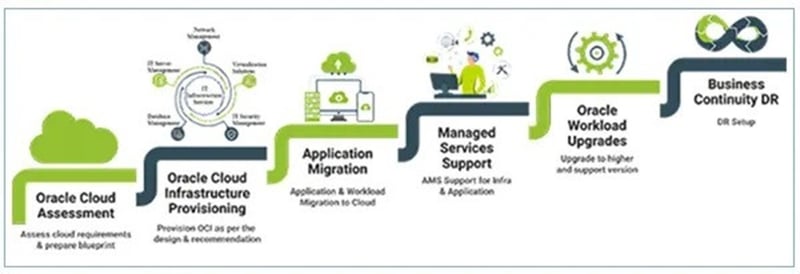
Today, businesses have become more dependent on Cloud (also known as utility or on-demand) services to foster productivity, save costs, and enable the growth of enterprises.
Among all the options, Oracle Managed Cloud Services (OMCS) is the solution that goes far beyond providing just a smooth migration to the Cloud but also incorporates test automation features that guide us toward the future of automating QA.
It differs from traditional testing, where software testing is done by utility services, allowing scalability and flexibility as it is accessible from any location and can handle many users.
So, in this read, we will dive deep into the key benefits of Oracle-managed services and explore how it is empowering enterprises with test automation.
Let’s start!
The Key Benefits of Oracle Managed Services
Before we delve deep into the article let’s explore the striking benefits of Oracle-managed services:
Continuous performance optimization: it analyses and optimizes the performance of Oracle applications, ensuring they deliver an enhanced user experience.
Data security and compliance assurance: It prioritizes data security and compliance over anything, implementing hardcore measures to meet sensitive information while meeting regulatory requirements.
Proactive issue identification and resolution: They often use advanced tools and employ experts from the field, which helps them detect serious problems at the early stage, further enhancing system reliability.
Applications upgrades and patches: It handles all the application updates and fixes to make sure it is up-to-date and user-friendly.
Customization and integration assistance: They also offer expertise in customizing applications and incorporating them with other business systems.
24/7 monitoring and support: They frequently monitor Oracle applications to make sure that it is available to the user, Minimizing downtime and disruption.
Oracle Managed Cloud Services
Purpose of Oracle Managed Cloud Services with Test Automation:
Their objective with test automation is to make organizations capable of operating in a technologically advanced Cloud environment where performance, security, and compliance levels are the highest possible.
By adopting automation under the Cloud services, they aim to address major concerns experienced in continuous testing, change management, application monitoring, and compliance readiness.
Continuous Testing:
Continuous Testing, in essence, is a significant part of Oracle Managed On-demand Services; apps and systems are constantly being assessed at various testing phases.
Applications are being automatically tested with the help of special systems that test the functionality, performance, and security of applications, identifying at the earliest possible stage potential problems that can be timely eliminated.
The iterated testing process improves the robustness of applications on the Cloud and leads to a seamless user experience.
Change Management:
The business world is indisputably a fluid environment where change is a basic highlight, yet Oracle Managed Utility Services with test automation is exceptional at change management.
Using automated testing tools, one can measure the dependencies of modifications being done to applications and infrastructure so that updates, patches, and adjustments are implemented gradually with no conflicts.
This proactive approach to change management reduces the risk of failures in systems and thus increases the level of stability imbibed with Cloud-based operations.
Application Monitoring:
Oracle’s Managed Services include powerful application monitoring features that rely on automation to track the performance, availability, and health of major applications. Automated monitoring tools automatically analyze metrics and alerts whereby potential problems are identified and resolved right in time. This proactive monitoring method prevents the applications on the Cloud from under-performance so the user satisfaction is up and that frustrates downtime.
Compliance Readiness:
Complying with the standards and regulations of the industry falls under the operations of the business firm. Automated compliance testing is part of Oracle Managed On-demand Services providing end-to-end checks to ensure that systems as well as applications conform to the required regulatory standards.
This preventive approach not only minimizes the chance of non-compliance but also takes away the unnecessary auditing that tends to be costly, consuming both time and materials.
Conclusion
Oracle Managed On-demand Services along with automation are a complete package for organizations looking to smoothly migrate to the Cloud. Opkey, a test automation company, makes this possible, streamlining processes like continuous testing, change management, application monitoring, and adoption readiness.
This collaboration ensures agility, reliability, and compliance for organizations leveraging Oracle’s Utility services. Opkey has become a pivotal official partner, offering an affordable approach to optimizing operations. Elevate your experience with Opkey – the go-to solution for a seamless, efficient, and innovation-driven transition to the Cloud.


















